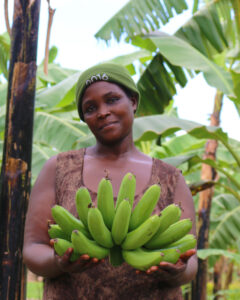PRESS RELEASE
28 April 2023 – CGIAR breeding of improved Root, Tuber, and Banana (RTB) crops that lie at the heart of many African agri-food systems received a $29,668,667 award from The Bill & Melinda Gates Foundation.

“This commitment by the Bill & Melinda Gates Foundation is recognition of the increasing importance of root, tuber, and banana staple crops in Africa. It will support our breeding partnership between CGIAR and national institutions that have proven to translate scientific research into tangible benefits to small-scale farmers and consumers in Africa,” said International Potato Center Director General Dr. Simon Heck.
For more than a decade, RTB research has developed modern and efficient breeding systems in Africa in the form of superior crop varieties and seed systems that have a significant impact on food and nutrition security, poverty alleviation, and the quality of life of farmers, processors, and consumers in rural and urban areas.
The crops at the heart of RTB in Africa are banana, cassava, potato, sweetpotato, and yam, some of Africa’s most important staple crops. They provide 50% of the total caloric intake in D.R. Congo, Ghana, Tanzania, and Rwanda, 30% in Uganda, and 25% in Nigeria, Africa’s most populous country. RTB crops are also drought and heat tolerant, two climate-smart characteristics of importance to the African continent experiencing record temperatures and a historic drought.
“By modernizing RTB breeding and seed systems, we are enabling farmers to fight climate change,” said Dr. Hugo Campos, deputy director of general research at CIP. “We work directly with farmers to develop the varieties of RTB crops that will survive in harsh conditions and provide them income and their communities food security.”
Campos leads the RTB Breeding program in close partnership with the Alliance Bioversity-CIAT, IITA, CIRAD (Centre de Coopération Internationale en Recherche Agronomique pour le Développement), Cornell University, North Carolina State University, University of Abomey Calavi (Benin), Ebonyi State University (Nigeria), Université Evangélique en Afrique (D. R. Congo), and Makerere University (Uganda), as well as the National Agricultural Research Services in Benin, Côte d’Ivoire, D. R. Congo, Ethiopia, Ghana, Kenya, Malawi, Mozambique, Nigeria, Tanzania, Togo, Uganda, and Zambia.
“RTB crops are on every table in Africa and play a critical role in the health and nutrition of African communities,” said Helen Hambly, CIP Board Chair. “For more than a decade, CGIAR centers have been working with national partners to develop improved RTB varieties bred for quality and marketability that specifically help women farmers access better markets for their produce and increase their incomes and livelihoods. Thanks to the Bill and Melinda Gates Foundation for recognizing the importance and potential of these climate-smart crops so that advanced varieties can become more widespread and improve the African continent’s food and nutrition security needs.”
“Since RTB crops have similar characteristics in the way they are propagated and have similar post-harvest issues, RTB breeding concentrates the brain power of breeders and inspires the cross-learning among crops,” said Neal Gutterson, CGIAR Board and CIP Board of Trustees member. “It also utilizes modernized, state-of-the-art breeding approaches in Africa to achieve higher genetic gains to benefit smallholder farmers and the accelerated adoption of new varieties of a major group of crops grown in Africa.”
For further information contact
Viviana Infantas, Events and Outreach Specialist, International Potato Center
About CIP
CIP was founded in 1971 as a research-for-development organization with a focus on potato, sweetpotato and Andean roots and tubers. It delivers innovative science-based solutions to enhance access to affordable nutritious food, foster inclusive sustainable business and employment growth, and drive the climate resilience of root and tuber agri-food systems. Headquartered in Lima, Peru, CIP has a research presence in more than 20 countries in Africa, Asia and Latin America.
About CGIAR
CGIAR is a global research partnership for a food-secure future. CGIAR science is dedicated to transforming food, land and water systems in a climate crisis. Its research is carried out by CGIAR Centers/Alliances in close collaboration with hundreds of partners, including national and regional research institutes, civil society organizations, academia, development organizations and the private sector. www.cgiar.org
